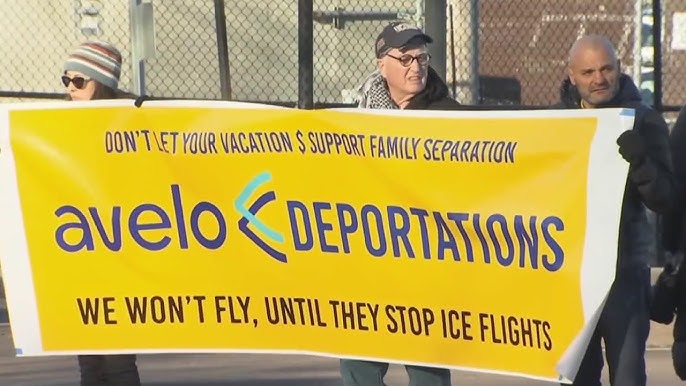Local Groups Protest Avelo-ICE Alliance In Wilmington
Several notable local organizations, such as the Immigrant Allies Forum, Indivisible Wilmington, and the Democratic Socialists of America’s Wilmington Chapter, established a presence along the pathway to Wrightsville Beach, urging vacationers to ‘express their beliefs.’ The organizers of the demonstration claimed their choice of venue was a strategic attempt to maximize the numbers of holidaymakers informed about the recent alliance struck between Avelo Airlines and the U.S. Immigration and Customs Enforcement (ICE), a partnership permitting deportation flights.
The same organizers spoke out on the concerns over county funds being utilized to promote Avelo and, subsequently, various destinations as preferred holiday stops. Their overarching goal was to ensure that tourists remained acutely aware that despite an attractive reduction in ticket price, there might be a significant human rights expense entailed. Avelo Airlines, currently functioning as a budget airline, provides services across 23 states.
Earlier this year, the airline inaugurated its latest operational base in Wilmington, sparking a series of demonstrations across the city in response. The first-ever protest against Avelo took place at the airport directly and was followed by the recent nationwide campaign initiated by the collaborative, with the objective of impacting the commercial aspects of Avelo’s services.
Now more than ever, this protest movement has garnered national recognition, which sees numerous cities housing Avelo services participate in nationwide demonstrations. One activist present at the protest outlined that Avelo, being a commercial airline, stands uniquely in having an established contract with ICE. They currently operate deportation flights in Arizona, bound for El Salvador.
The principal message being conveyed to the public is a call for a consumer boycott against the airline. While it is acknowledged that consensus on the topics of immigration is varied and influencing individual opinions can be challenging, the advocacy groups are encouraging travelers to at least make alterations in their airline preferences.
As one demonstrator remarked, these campaigns seem to be achieving their objectives, citing the recent downsizing decisions taken by Avelo Airlines in terms of flight and route offerings. These changes, however, do not apply to the Wilmington area, but to other parts of the country.
The local protest groups’ ambition is that their efforts will incite substantial transformations locally. Avelo, in their defense, supports the decisions made to cooperate with ICE as it guarantees the company’s financial robustness.
To evaluate the verity of the allocations of county funds to Avelo, an investigation was launched by one of the advocacy groups. The group made a formal public records request from the New Hanover County Airport Authority. After a few months of waiting, the enquiry was finally responded to by the Deputy Director of the Airport, who confirmed that no funds from the Airport Authority were allocated for Avelo’s operations, nor were there any finances approved for amendments in Avelo’s budget.
The Deputy Director forwarded a copy of Alien’s lease agreement stating it is in compliance with the norms for all airlines operating from ILM and also provided details of the authority’s incentive scheme, which is open to all airlines. After continued correspondence, it was eventually confirmed that local marketing funding had been deployed to endorse Avelo flights and the ILM Airport.
Since its initiation of operations, Avelo has significantly boosted the local economy. However, one protestor voiced skepticism about Avelo’s true impact, considering the county’s tourism spending had already reached $1.1 billion in 2023.
In the fiscal year under review, the total annual GDP of the county stood less than $20 billion, making it hard to believe that Avelo could account for so much of the economy. These statistics paint a confusing picture enticing one to question whether Avelo indeed played as significant a role as claimed in boosting the economy.
However, the protestor added an accent on the more prominent ethical question alienated by the discussion of economic impact. The struggle revolves around the question of how a society can reconcile with endorsing an airline, such as Avelo, involved in contentious and potentially inhumane deportation flights while benefiting from their operations.
The conundrum further deepens as one ponders on the moral cost of retaining these cognitive dissonance and whether society is willing to contravene their moral belief system due to an economic advantage.
The complex dilemma presents a challenge for society to grapple with whether they should continue tolerating these deportation flights purely based on our profit from their other services. Indeed, the broader question that arises is to what extent are we willing to put a price tag on our morality?
It becomes therefore a matter of key importance to debate whether these economic advantages justify overshadowing the controversies surrounding the airline and, more specifically, its involvement in what could be considered as illegal and inhumane deportation practices.

